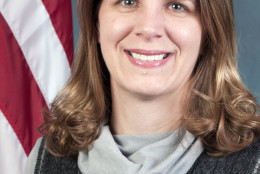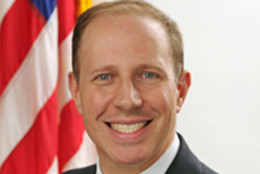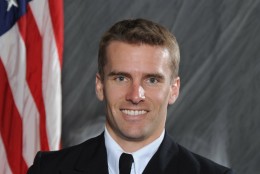Defense Department
-
The Congressional Budget Office has found, the Defense Department could save billions by replacing uniformed people with civilian or contractors in certain non-combat, support jobs. But should it? Nora Bensahel, a military analyst and scholar in residence at American University, shared her analysis of the CBO report on Federal Drive with Tom Temin.
December 09, 2015 -
The last barrier for women in the military has been removed. Defense Secretary Ash Carter said women in any of the armed services could soon serve in any of the combat responsibilities. The move raises a lot of questions. How will it affect readiness? Combat effectiveness? Logistics? For some possible scenarios, Federal Drive with Tom Temin turned to retired Army Lt. General David Barno, now a scholar-in-resident at American University.
December 07, 2015 -
Defense Department spending rises every year, even after sequestration. But the fighting force is shrinking. In effect, DoD is doing less with more. Retired Marine Corps Maj. Gen. Arnold Punaro, head of the Punaro Group, has been saying on Capitol Hill that Congress and the Pentagon need to tackle their built-in costs. The DOD Comptroller recently said the department would get 96 percent of what it asked for in 2017. Federal Drive with Tom Temin asked Punaro if that's a useful metric.
December 04, 2015 -
Pentagon brass are starting to get specific about the technologies they're looking for to produce the military advantage they'll need. The so-called third offset strategy acknowledges that the edge from stealth and guided munitions has evaporated. Bloomberg defense analyst Rob Levinson has been following the offset strategy and tells Federal Drive with Tom Temin what the defense industry can expect and what military planners are hoping to achieve.
December 02, 2015 -
"I'm telling you right now, 10 years from now if the first person through a breach isn't a fricking robot, shame on us." -- Deputy Defense Secretary Bob Work
November 30, 2015 -
As possibly the biggest buyer of fuel in the world, the Defense Department can ill-afford to make mistakes in forecasting prices. If it guesses wrong, it could face billions in unforeseen costs. But the Government Accountability Office found mistakes can happen. And this one was a doozy. Johana Ayers, GAO's director of defense capabilities and management issues, fills in Federal Drive with Tom Temin on all the details.
November 25, 2015 -
In anticipation of the upcoming "Star Wars" film, crewmembers from the USS Dwight D. Eisenhower created a parody movie trailer: "Sea Wars: The Ike Awakens."
November 25, 2015 -
Think health IT and what comes to mind? Doctors pulling up your health record at a visit? You, downloading your medical information? Probably with the Blue Button — a federal invention? Nearly all hospitals and doctors’ offices use health technology in some fashion thanks largely to a big push from the federal government. Dr. Jon White is deputy national coordinator for health IT, the office charged with taking the initiative to the next level. On Federal Drive with Tom Temin, he spoke with Federal News Radio’s Emily Kopp.
November 23, 2015 -
The Office of Personnel Management's watchdog says a quality assessment conducted by the agency on questionable background investigations has some problems of its own.
November 23, 2015 -
The Pentagon has spent more than half a century refining the ways it buys from small business. In recent years, the Defense Department has met its statutory goal of awarding 23 percent of its contracting dollars to small and disadvantaged concerns. But that emphasis has come at a cost and not necessarily in dollars. Bill Lucyshyn is former Research Director at DARPA and now director at the Center for Public Policy and Private Enterprise at the University of Maryland's School of Public Policy. He joins Federal Drive with Tom Temin with more on a just-completed study of the Pentagon and small business.
November 17, 2015 -
Jon Etherton, president of Etherton & Associates Inc., joins host Roger Waldron to discuss the state of commercial item acquisition, contract duplication and the FY 2016 National Defense Authorization Act. November 10, 2015
November 09, 2015 -
When sequestration led agencies to furlough employee two years ago, not everyone took it lying down. The National Federation of Federal Employees launched two lawsuits. It accused the Defense Department of violating the law. The employees' salaries were not paid from the main pot of funds that had been cut by the law. There's now an ending to this story. Here to tell it is Debra D'Agostino, an employment attorney at the Federal Practice Group Worldwide Service, in this week's Legal Loop.
November 05, 2015 -
President Barack Obama's administration continues to work toward his goal of U.S. energy independence by 2018. Meeting that goal may be good policy, but it may not be good military strategy. Lt. Cmdr. Scott Bennie of the Navy Reserve joined In Depth with Francis Rose on Pentagon Solutions. He explained the strategy problem in a piece for the U.S. Naval Institute. His views are his own and not the views of the Navy or the Naval Institute. He said walking away from our relationships with oil producing countries could leave us in a precarious situation militarily.
November 04, 2015 -
Jason Workmaster, off counsel at Covington & Burling LLP, joins host Roger Waldron to discuss the state of commercial item contracting. November 3, 2015
November 03, 2015 -
View a photo gallery of the variety of activities Defense Department personnel participate in daily around the globe.
November 03, 2015














